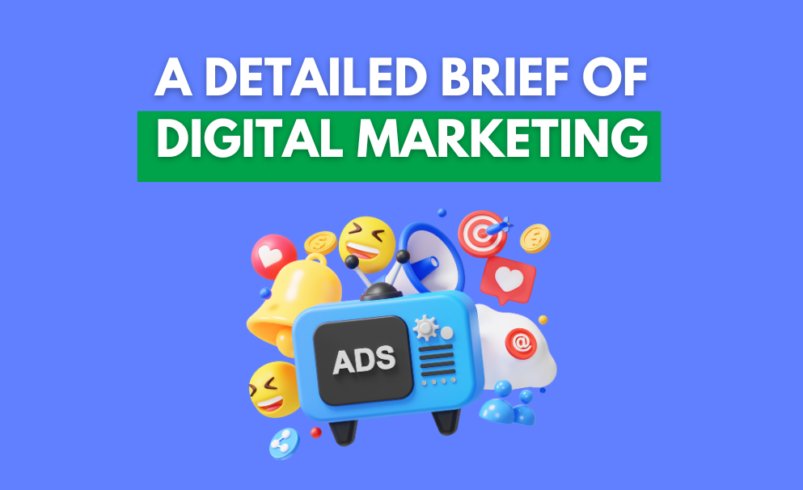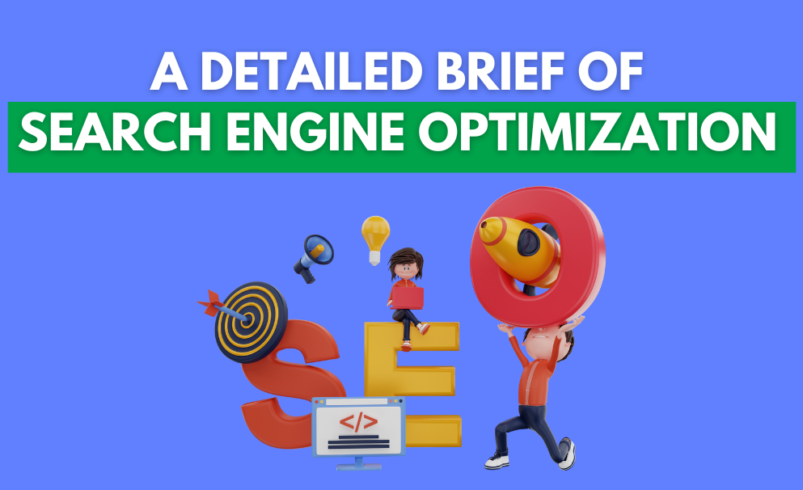
A Detailed Brief of Digital Marketing
Digital marketing has revolutionized the way businesses reach and engage with their target audiences. With the proliferation of digital channels and technologies, businesses now have more tools and strategies at their disposal than ever before. This detailed brief explores the key components of digital marketing, its benefits, and how businesses can leverage it to build strong brands and achieve their marketing objectives.
1. What is Digital Marketing?
Digital marketing refers to the use of digital channels and technologies to promote products, services, and brands. It encompasses a wide range of tactics and strategies aimed at reaching and engaging with consumers online. Digital marketing channels include:
- Search Engines: Utilizing search engine optimization (SEO) and paid search advertising (PPC) to improve visibility in search engine results pages (SERPs).
- Social Media: Engaging with audiences on platforms like Facebook, Instagram, Twitter, LinkedIn, and more.
- Email Marketing: Sending targeted and personalized emails to nurture leads and build customer relationships.
- Content Marketing: Creating and distributing valuable content to attract and retain a clearly defined audience.
- Display Advertising: Using banner ads, video ads, and other formats to promote brands across the web.
- Affiliate Marketing: Partnering with affiliates to promote products and earn commissions on sales.
- Influencer Marketing: Collaborating with influencers to reach their followers and promote products.
2. The Benefits of Digital Marketing
Digital marketing offers numerous advantages over traditional marketing methods. Some of the key benefits include:
- Cost-Effective: Digital marketing often costs less than traditional advertising channels like TV, radio, and print.
- Targeted Reach: Advanced targeting options allow businesses to reach specific demographics, interests, and behaviors.
- Measurable Results: Digital marketing provides detailed analytics and insights, enabling businesses to measure the effectiveness of their campaigns and make data-driven decisions.
- Flexibility: Digital marketing strategies can be quickly adjusted and optimized based on performance data.
- Enhanced Engagement: Interactive and engaging content can foster deeper connections with audiences.
- Global Reach: Digital marketing enables businesses to reach audiences around the world, expanding their market presence.
3. Key Components of Digital Marketing
To build a successful digital marketing strategy, businesses should focus on the following key components:
Search Engine Optimization (SEO)
SEO is the process of optimizing a website to improve its visibility in organic search results. Key elements of SEO include:
- Keyword Research: Identifying relevant keywords and phrases that potential customers use to search for products or services.
- On-Page SEO: Optimizing website content, meta tags, and headings to include target keywords.
- Off-Page SEO: Building high-quality backlinks from authoritative websites to improve domain authority.
- Technical SEO: Ensuring the website is technically sound, with fast loading times, mobile-friendliness, and secure connections (HTTPS).
Pay-Per-Click Advertising (PPC)
PPC advertising involves paying for ads that appear in search engine results or on other websites. Key elements of PPC include:
- Keyword Bidding: Bidding on keywords to have ads appear in search engine results.
- Ad Copy: Creating compelling ad copy that attracts clicks and conversions.
- Landing Pages: Designing optimized landing pages that provide a seamless user experience and encourage conversions.
- Analytics: Tracking and analyzing campaign performance to optimize for better results.
Content Marketing
Content marketing focuses on creating and distributing valuable, relevant, and consistent content to attract and retain a clearly defined audience. Key elements of content marketing include:
- Blogging: Writing informative and engaging blog posts that address audience needs and interests.
- Ebooks and Whitepapers: Offering in-depth resources that provide valuable insights and information.
- Infographics: Creating visually appealing infographics that convey complex information in an easily digestible format.
- Videos: Producing video content that engages and educates the audience.
Social Media Marketing
Social media marketing involves using social media platforms to connect with audiences, build brand awareness, and drive traffic and sales. Key elements of social media marketing include:
- Content Creation: Developing a content strategy that includes posts, stories, and videos.
- Engagement: Interacting with followers, responding to comments, and fostering community.
- Advertising: Running paid social media campaigns to reach targeted audiences.
- Analytics: Monitoring social media metrics to measure performance and adjust strategies.
Email Marketing
Email marketing involves sending targeted emails to a list of subscribers to nurture leads and build relationships. Key elements of email marketing include:
- List Building: Growing an email list through opt-in forms, lead magnets, and sign-up incentives.
- Segmentation: Segmenting the email list based on demographics, behaviors, and preferences.
- Personalization: Crafting personalized email content that resonates with recipients.
- Automation: Using email automation tools to send timely and relevant messages.
4. The Future of Digital Marketing
The digital marketing landscape continues to evolve rapidly, with new technologies and trends shaping the future. Key trends to watch include:
- Artificial Intelligence (AI): AI-powered tools and algorithms are enhancing personalization, predictive analytics, and customer service.
- Voice Search: The rise of voice-activated devices is changing the way people search for information online.
- Video Content: Video remains a dominant content format, with live streaming and short-form videos gaining popularity.
- Augmented Reality (AR) and Virtual Reality (VR): AR and VR technologies are creating immersive brand experiences.
- Data Privacy: Increasing concerns about data privacy are driving changes in how businesses collect and use customer data.
Conclusion
Digital marketing is a powerful and essential tool for businesses looking to build strong brands and connect with their target audiences. By understanding the key components of digital marketing and staying ahead of emerging trends, businesses can create effective strategies that drive growth and success. At EZ Brand Builders, we are committed to helping businesses navigate the complexities of digital marketing and achieve their online marketing goals. By leveraging the power of digital marketing, businesses can build strong, recognizable brands that resonate with their audience and thrive in the digital age.









